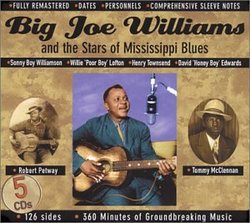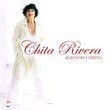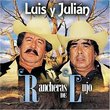| All Artists: Big Joe Williams Title: Big Joe Williams & The Stars of Mississippi Blues Members Wishing: 0 Total Copies: 0 Label: Jsp Records Release Date: 3/9/2004 Genres: Blues, Pop Styles: Delta Blues, Acoustic Blues Number of Discs: 5 SwapaCD Credits: 5 UPCs: 788065771928, 669910195253 |
Search - Big Joe Williams :: Big Joe Williams & The Stars of Mississippi Blues
 | Big Joe Williams Big Joe Williams & The Stars of Mississippi Blues Genres: Blues, Pop
|
Larger Image |
CD DetailsSimilar CDs
|
CD ReviewsBig Joe Williams and the Stars of Mississippi Blues Stuart Jefferson | San Diego,Ca | 06/23/2008 (5 out of 5 stars) "Five discs. 72,74,71,74,72 min. each approximately. Remastered sound. This is an overview of a number of well-known bluesmen from the Mississippi area. Starting off with Big Joe Williams on vocal and guitar,he is accompanied by Henry Townsend,'Dad'Tracy ,Robert Lee McCoy,and Sonny Boy Williamson among others. The sound is very much rural Mississippi,with titles like 49 Highway Blues,Baby Please Don't Go,and Crawlin' King Snake. This is music just prior to a more modern sound that would use electrfied instruments to get the sound across to listeners.
The second disc is where musicians began to explore amplification. The sound and feel of these tracks is still very much in the country style,however, amplified guitars were beginning to be heard. This is where the combination of country sounding arrangements with amplified guitar started and the combination is very effective. The sides here are all small group recordings,ranging from duos to quartets with Sonny Boy Williamson on harmonica. Tracks range from P Vine Blues ,to She Left Me A Mule,to Baby Please Don't Go. The third disc is given over to Tommy McClennan,who was not a true professional musician. His versions of his and anyone elses songs would constantly change to suit his thinking. The sides here range from his solo vocal/guitar sound to expanding(?) to a duo with a bass player. McClennan's voice is suitably rough along with his guitar playing,which while rudimentary is effective. A look at the titles will reveal a number of well-known songs done by others,however,they are done in the McClennan style which is fine. The fourth disc begins with McClennan in a duo setting,which expands to a trio with the fine bassist Ransom Knowling and Robert Petway on second guitar. Having a fuller group on these tracks seems to flesh out the sound and gives them much needed flavor. McClennan's voice is set in front of the group and is very arresting. There are a number of well-known songs here such as Shake It Up And Go,Cross-cut Saw Blues,and Bluebird Blues. Robert Petway closes out this set with his take on tunes like Catfish Blues,Rockin' Chair Blues,and My Little Girl. Petway sings and plays guitar along with stalwart bass player Alfred Eakins,who plays an "imitation"bass. Both of these men never recorded much if at all after this. McClennan drank himself away and Petway seemed to disappear,never to be heard of much again. The final disc begins with Petway recording in Chicago in 1942 in much the same vein as his previous tracks. The great David "Honeyboy"Edwards is up next and what a treat this is. His voice is primal in every sense of the word. His guitar is used as a counterpoint to his voice,never stepping out but used to great effect. At this writing he is still alive and has written a book about his life and times that anyone with an interest in this era should read. This disc closes out with Willie Lofton,a vocalist/guitarist who recorded very little. Along with that,very little is known about him,possibly being born in Mississippi and dying about twenty years after these tracks were made. He is accompanied by piano,bass,and kazoo. This music forms the basis of all future blues music,and as such, should be heard by everyone with an interest in the blues and where it came from." |

 Track Listings (24) - Disc #1
Track Listings (24) - Disc #1


